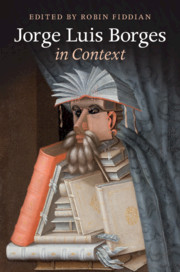Book contents
- Jorge Luis Borges in Context
- Jorge Luis Borges in Context
- Copyright page
- Contents
- Illustrations
- Contributors
- Acknowledgements
- Permissions
- Note on Primary Sources and Editions Used
- Chronology
- Note on Translations and Abbreviations
- Introduction Borges in Context, Context in Borges
- Part I Self, Family, and the Argentine Nation
- Part II The Western Canon, the East, Contexts of Reception
- Chapter 17 Borges and Cervantes
- Chapter 18 Borges’s Shakespeare
- Chapter 19 Borges and the Dialectics of Idealism
- Chapter 20 The English Romantics and Borges
- Chapter 21 Borges and the First Spanish Avant-Garde
- Chapter 22 Borges and James Joyce: Makers of Labyrinths
- Chapter 23 Borges and Kafka
- Chapter 24 Borges and the Bible
- Chapter 25 Borges and Judaism
- Chapter 26 Borges and Buddhism
- Chapter 27 Borges and Persian Literature
- Chapter 28 Borges and the ‘Boom’
- Chapter 29 Argentina and Cuba: The Politics of Reception
- Chapter 30 Borges and Coetzee
- Chapter 31 Borges in Portugal
- Chapter 32 Borges and Italy
- Further Reading
- Index
Chapter 32 - Borges and Italy
from Part II - The Western Canon, the East, Contexts of Reception
Published online by Cambridge University Press: 16 January 2020
- Jorge Luis Borges in Context
- Jorge Luis Borges in Context
- Copyright page
- Contents
- Illustrations
- Contributors
- Acknowledgements
- Permissions
- Note on Primary Sources and Editions Used
- Chronology
- Note on Translations and Abbreviations
- Introduction Borges in Context, Context in Borges
- Part I Self, Family, and the Argentine Nation
- Part II The Western Canon, the East, Contexts of Reception
- Chapter 17 Borges and Cervantes
- Chapter 18 Borges’s Shakespeare
- Chapter 19 Borges and the Dialectics of Idealism
- Chapter 20 The English Romantics and Borges
- Chapter 21 Borges and the First Spanish Avant-Garde
- Chapter 22 Borges and James Joyce: Makers of Labyrinths
- Chapter 23 Borges and Kafka
- Chapter 24 Borges and the Bible
- Chapter 25 Borges and Judaism
- Chapter 26 Borges and Buddhism
- Chapter 27 Borges and Persian Literature
- Chapter 28 Borges and the ‘Boom’
- Chapter 29 Argentina and Cuba: The Politics of Reception
- Chapter 30 Borges and Coetzee
- Chapter 31 Borges in Portugal
- Chapter 32 Borges and Italy
- Further Reading
- Index
Summary
Marco Polo, Petrarch, Tasso, Croce interested Borges, however Dante sat at the very highest pinnacle in his map of world literature and permeates his works. Italy took to Borges with intense enthusiasm, starting in the mid-1950s, earlier than in most countries. Following his death, a pivotal point came in 1998 when the rights to his entire oeuvre were acquired by the publishind house, Adelphi. Many highly important writers absorbed Borgesian elements, with Calvino, Sciascia, and Eco standing out. The case of Eco as a Borges avatar is compelling. Sciascia drew out hidden political and historical aspects in Borges’s work. Borges exercise influence on Italian fantastic literature both before and after his death. And the adaptation of ’Theme of the Traitor and the Hero’ by Bertolucci in ’The Spider’s Stratagem’ is an example of the astonishing energy Borges gave to two generations and more of Italian literature and culture.
- Type
- Chapter
- Information
- Jorge Luis Borges in Context , pp. 259 - 266Publisher: Cambridge University PressPrint publication year: 2020
- 1
- Cited by

